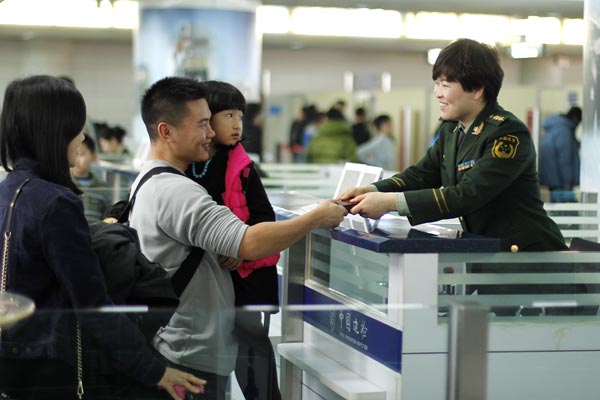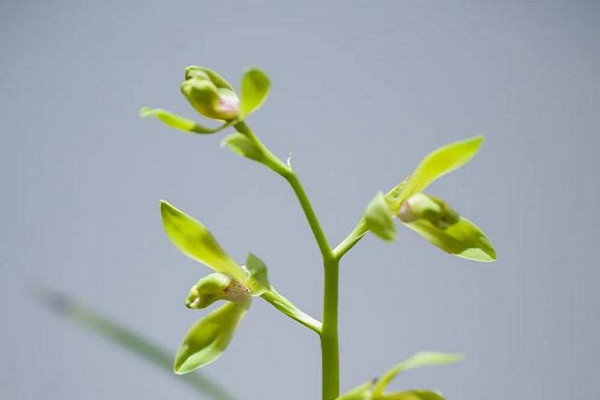 |
A family gives their passports to a customs officer at Qingdao Liuting International Airport. Forty-five countries and regions have introduced - or are set to introduce - visa exemptions or visa-on-arrival policies for Chinese travelers this year. Xie Hao / for China Daily |
Mi Lan could barely contain her excitement when she found out that Thailand had introduced a visa-on-arrival policy for Chinese travelers.
"This is great news for travel enthusiasts like me because I won't be troubled with time-consuming visa procedures and can travel at any time," said the 26-year-old who lives in Beijing.
Thailand is one of 45 countries and regions that have introduced - or are set to introduce - visa exemptions or visa-on-arrival policies for Chinese travelers this year, according to a statement from the Ministry of Public Security.
Under the policy, travelers are allowed to arrive at one of the 45 countries or regions with their valid passports and a return flight ticket. Tian Ye, a senior officer from the Beijing General Station of Exit and Entry Frontier Inspection, said the policy "simplifies visa procedures and provides more convenience".
The move is a blessing for individual Chinese tourists, who were previously limited to group tours if they wanted to vacation in several countries such as Thailand.
A micro-blogger surnamed Liu wrote on his micro blog on Jan 31 that he went to Beijing Capital International Airport and immediately got a flight to Bangkok after an airport staff member confirmed that Thailand had adopted the new visa-free policy. The 29-year-old said he simply showed his passport and flight ticket at the boarding gate and was permitted to pass.
Despite the expedient policies, Tian said inspection procedures will be enhanced.
"Inspection procedures are always a priority. Ensuring exit-entry safety is key," he said. "But we'll improve our inspection efficiency in an aim to shorten wait times for passengers to less than 45 seconds."
Statistics are currently not available to show how many Chinese travels have used the visa-on-arrival policies since the beginning of the year, but the Beijing General Station of Exit and Entry Frontier Inspection said on its micro blog that outbound tourism during the Spring Festival holiday, which ran from Jan 31 to Feb 6, had a surge in travelers.
"The visa policy, I believe, will, over the long term, bring a higher increase in travelers and may push tour agencies to develop more attractive routes," Tian added.
Shi Kaifeng, a public relations officer at online travel agency Ctrip, said the visa exemption and visa-on-arrival policies are expected to boost the growing outbound travel market.
"The simplified visa procedures will effectively shorten the registration time for group and individual travelers," said Shi, whose agency will handle over 100 group tours from Shanghai to Thailand over the next two months.
Sales of Ctrip's holiday packages to Thailand during the weeklong Spring Festival holiday jumped 100 percent from the previous year, he claimed.
According to a Ctrip survey in January, Thailand, South Korea's Jeju Island, and the Maldives will become the three hottest attractions.
But a word of caution was given by Mao Yi, communications head of Spring Airlines, a Shanghai-based budget airline provider. Mao urged travelers to look out for specific visa requirements to their respective destinations.
For instance, Vietnam's visa-on-arrival policy is only applicable to travelers under urgent circumstances. He added that travelers to Malaysia are required to bring a specified amount of cash if they apply for a visa on arrival.
Wang Bin, an officer in the frontier inspection office in Tianjin, agreed.
"Visa policies vary. For example, if a traveler wants to go to Seoul from Jeju Island, they still need a visa," he added.
Liu Deqian, vice-director of the tourism research center at the Chinese Academy of Social Sciences, welcomed the new policies.
"Although the policies will encourage more people to go abroad, preparation is still necessary. After all, visas are just one step on any trip."


